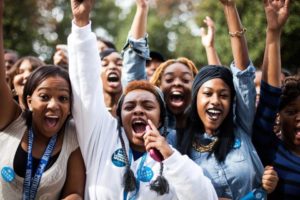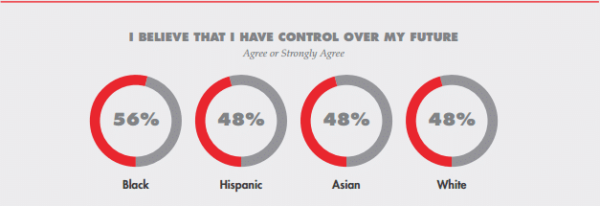
About 48 percent of Black millennials said achieving the “American Dream” was still very much important to them. Image courtesy of wearyourvoicemag.com.
Even in the face of race-based oppression, Black millennials are keeping their heads to the sky. In fact, Black young adults are the most optimistic about their future in America when compared to Latino, Asian and white millennials, a new study revealed.
A collaborative research project conducted by the University of Texas and Latino advertising agency Richards/Lerma published on Monday, March 20, studied the attitudes of Americans aged 18 to 34 on their faith in the “American Dream” and their ability to achieve success in the future. What researchers discovered couldn’t be further from what they expected, as “the data reached out and smacked us with untold cultural stories.”
The study, titled “Millennials Deconstructed,” showed that although Black millennials ranked race issues as the top concern facing the nation today, they expressed the most hope for the future, beating out millennials of all other racial groups at 61 percent. Close to 54 percent of Hispanic and Asian millennials said they were “optimistic or very optimistic” about the future compared to 50 percent of whites.
Researchers noted that some might expect to uncover a sense of despair, indifference or a complete loss of hope among African-American millennials. The report, however, showed the very opposite. Black young adults were more likely to express dissatisfaction with life (67 percent), yet were still the most optimistic about their futures.
“Although our initial intent in this report was to strictly define and deconstruct the American Dream by racial/ethnic segment, a much more interesting story emerged after analyzing the results,” wrote Chaille Alcorn, a strategic planner at Richards/Lerma who had a hand in the study. “While the differences between the way the groups define and relate to the American Dream are interesting, what’s far more compelling is how their cultural/ethnic backgrounds shape their responses in counterintuitive ways.”
Following the rash of fatal shootings involving African-Americans by police, Black activists emerged to protest systemic racial oppression and white privilege, which critics interpreted as showing disrespect for America, playing the victim, begging for handouts and eschewing personal accountability for the state of their lives, among other things. The researchers’ data thoroughly debunked this misconception as well.
Rather than an alleged “disrespect” for this country, Black millennials actually have a lot of pride, with 83 percent of respondents saying they were proud to be an American.
“This suggests their vocalization of injustice isn’t at odds with respect for their nation,” the study read. “In fact, it’s possible their motivation to speak up is because of their national pride, because they hold their country to a high standard.”
According to the research, African-American millennials also showed the strongest sense of control over their futures (56 percent) and were more likely to believe that their hard work would eventually pay off (59 percent). A lesser 48 percent of Latino, Asian and white young adults felt they had control of their futures, while 56 percent of Latinos, 55 percent of Asians and 46 percent of white millennials believed their dreams would come true if they continued to work hard.
Though young African-Americans are still buying into and striving for the American Dream, 54 percent of respondents agreed their race made it more difficult achieve. For 48 percent of Black millennials, the American Dream is still very much relevant and important.
“This is a dream that propels them to be diligent in their aspirations and ambitions, and a dream that rides on the tracks of equality for them and their peers,” researchers concluded. “Their speaking out against racial injustice is not at odds with their self-accountability or love for America, but rather a direct result of it.”




